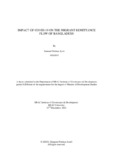| dc.contributor.advisor | Chowdhury, Afsan | |
| dc.contributor.author | Jyoti, Jannatul Ferdaus | |
| dc.date.accessioned | 2022-08-08T06:35:21Z | |
| dc.date.available | 2022-08-08T06:35:21Z | |
| dc.date.copyright | 2021 | |
| dc.date.issued | 2021-12 | |
| dc.identifier.other | ID 19262015 | |
| dc.identifier.uri | http://hdl.handle.net/10361/17074 | |
| dc.description | This thesis is submitted in partial fulfillment of the requirements for the degree of Masters of Development Studies, 2021. | en_US |
| dc.description | Cataloged from PDF version of thesis. | |
| dc.description | Includes bibliographical references (pages 51-59). | |
| dc.description.abstract | This study examined the impact of COVID-19 on Bangladesh's migrant remittances, based on the highest remittance received during the pandemic, with in-depth interviews with key informants to explore various explanations, using newly acquired combined data from a purposively designed survey of 171 migrant families from three districts of Bangladesh, namely Shariatpur, Madaripur, and Brahmanbaria. The patterns and determinants of remittances during the pandemic are also examined in this study. The method of remittance transfer process is another important considering factor in this paper. Remittances, which are a key source of foreign exchange, also contribute to Bangladesh's poverty reduction. It also assists Bangladesh by easing foreign exchange limits, maintaining the rate of exchange, and making it easier to buy much-needed raw resources, intermediate products, and industrial goods. As per the World Bank, global remittances would plummet by around 20% in 2020 as a result of the economic disaster precipitated by the COVID-19 epidemic and shutdown. Although remittances were projected to drop in Bangladesh, they actually increased. In 2020, it earned $21.8 billion. However, an examination of causes shows it probably occurred due to a). workers bringing back all their savings home as they would be returning after a job loss or similar reasons. b). The informal channels of remittance dried up due to the GOB decision to reward those using the formal channel through incentives and less profit offered by the informal sector. | en_US |
| dc.description.statementofresponsibility | Jannatul Ferdaus Jyoti | |
| dc.format.extent | 59 pages | |
| dc.language.iso | en | en_US |
| dc.publisher | Brac University | en_US |
| dc.rights | Brac University theses are protected by copyright. They may be viewed from this source for any purpose, but reproduction or distribution in any format is prohibited without written permission. | |
| dc.subject | Covid-19 | en_US |
| dc.subject | Remittance flow | en_US |
| dc.subject | Incentives | en_US |
| dc.subject | Formal channels | en_US |
| dc.subject | Informal sectors | en_US |
| dc.subject.lcsh | Emigrant remittances -- Bangladesh. | |
| dc.title | Impact of Covid-19 on the migrant remittance flow of Bangladesh | en_US |
| dc.type | Thesis | en_US |
| dc.contributor.department | BRAC Institute of Governance and Development, Brac University | |
| dc.description.degree | M. Development Studies | |

